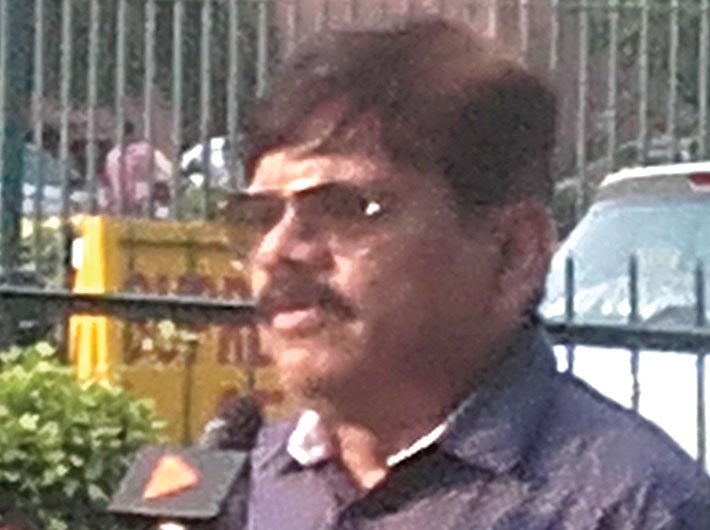Aditya Verma, secretary of the Cricket Association of Bihar (CAB) which is yet to be recognised by the BCCI, has been batting for a full membership for more than a decade.
Aditya Verma, secretary of the Cricket Association of Bihar (CAB) which is yet to be recognised by the BCCI, has been batting for a full membership for more than a decade. Since 2005, he has also been fighting for transparency and accountability in the working of the BCCI. It was on his petition that the supreme court directed N Srinivasan to step down as the BCCI chief. Another fallout of his petition was the constitution of the justice Lodha committee. The committee’s radical reforms will overhaul the internal mechanics of the BCCI. Naturally, Verma has made a lot of enemies in the process. But he hopes that this would create better prospects for cricketers in the country. In conversation with Governance Now, he shares his enthusiasm for the unprecedented reforms, which will be ushered in the BCCI.
How do you see the BCCI transforming in the wake of the reforms recommended by the Lodha committee?
There won’t be any effect on the financial health of the BCCI due to the Lodha committee reforms. The BCCI was formed in 1928 and has contributed massively in the field of cricket. Many players, who have marked out a name for themselves in cricket and for India, have received support from the BCCI. However, for the last few years, since the IPL was started, a huge amount of funds have started accruing to the BCCI coffers. The IPL extravaganza was started under Lalit Modi and he helped BCCI earn a profit of anywhere in the range of Rs 8,000-10,000 crore for the first two seasons. After that, another businessman, N Srinivasan, who was also the secretary of the BCCI at that time, on realising the immense value of the IPL conspired to throw Modi out of the scene. Later, he went on to capture the BCCI with the force of his money and promises. With the Lodha committee reforms being accepted, all of this will change.
It has been a long battle for you. What has provoked you to fight this campaign?
Once Bihar was split into two in 2000, Jharkhand was given full membership of the BCCI, but unfortunately Bihar was not given membership. At that time, IPS officer Amitabh Choudhary, who was juggling work as well as cricket-related activities, helped Jharkhand secure a full membership in the name of Bihar. This was an unfortunate event. The boys of Bihar have been suffering from that decision for the last 15 years. Had Bihar been a full member today, who knows, 10 Sachin Tendulkars might have come from there.
I jumped into the fray in 2005 when I saw that a small state like Jharkhand was given full membership after being separated from a bigger state. Bihar was deprived of its full membership and was asked to apply for it afresh. I found it to be unjust and raised my voice against it.
The Lodha committee reforms have instituted the practice of ‘one state, one vote’. This, many say, will level the playing field for all states. How will this benefit state associations?
I feel that the order given by the SC will make the BCCI more transparent and accountable. Another point that I raised before the court and the justice Lodha committee was that the BCCI creates a team for India. However, this team comprises of boys only from 20 states, the remaining are either unrecognised or have been given a secondary recognition. The SC by approving the Lodha committee report has allowed equal representation to all the states, which includes Bihar, Uttarakhand and the northeastern states.
The BCCI in its constitution mentions that its goal is to promote cricket all over the country. Then, why do they adopt such discriminatory practices? Who will the boys from other states play for – Sri Lanka, Pakistan?
Gujarat receives an annual subvention of Rs 120 crore from the BCCI, because there are three members from that state – Saurashtra, Baroda and Gujarat. Mumbai receives Rs 160 crore, Andhra Pradesh Rs 80 crore and Kolkata Rs 80 crore. Looking at these huge disbursements, the SC has forced these states to adopt transparent measures within the BCCI. This will benefit the game in the country. Think of all the good these reforms would do for the boys from other states who till now were prevented from playing cricket. Imagine if Sachin Tendulkar or Virat Kohli were born in Manipur or Sikkim. Then despite their god-gifted skills, they would not have been able to play for their country, because these states are unrecognised.
The BCCI has often argued that having a CAG nominee as a board member will lead to its disqualification from the International Cricket Council (ICC).
The BCCI is claiming this, not the ICC. If that is the case, then why is the Pakistani prime minister running the Pakistan cricket board? Why is the Sri Lankan cricket board being handled by the Sri Lankan government? Why nominees of the West Indian government are on the West Indies cricket board?
The BCCI has been less than accommodating and welcoming of the reforms.
The Lodha committee did not put an application in the SC expressing interest in investigating the matter. It was called upon to do so by the SC. The committee consists of three judges, including the former chief justice of India [RM Lodha]. This committee is, in a way, an extension bench of the SC.
The committee hasn’t spoken of changing the rules of the game – say an over should be of eight balls or batting should happen only from one end or the ball should be white, not red. All it has said concerns transparency, accountability and fairness within the BCCI. The only people who would be inconvenienced by this are those who till now have been running the BCCI as their own private shop or personal legacy. The supreme court has gone to the heart of the matter and the outcome will be the one to behold.
State associations have often maintained that they cannot be forced to adopt the reforms suggested by the committee. What is your reply to them?
When senior counsel Kapil Sibal was appearing on behalf of the Baroda Cricket Association, he argued that no one can force the association to adopt the Lodha committee reforms. Then, the SC said that the local cricket association should separate itself from the BCCI and only stick to looking after cricket in Baroda. The SC stressed that the Baroda Cricket Association had a standing simply because it was affiliated with the BCCI, and when an issue of the BCCI’s transparency is being discussed then the Baroda association is not different from its parent body. State association officials should disabuse themselves of this notion that they are a separate entity from the BCCI. Their identity is on the basis of their affiliation with the BCCI and the funds that are with them have been given by the BCCI. The BCCI often remits money so that state associations can be called to stand by it, as and when needed.
kaushal@governancenow.com
(The interview appears in November 1-15, 2016 edition of Governance Now)

